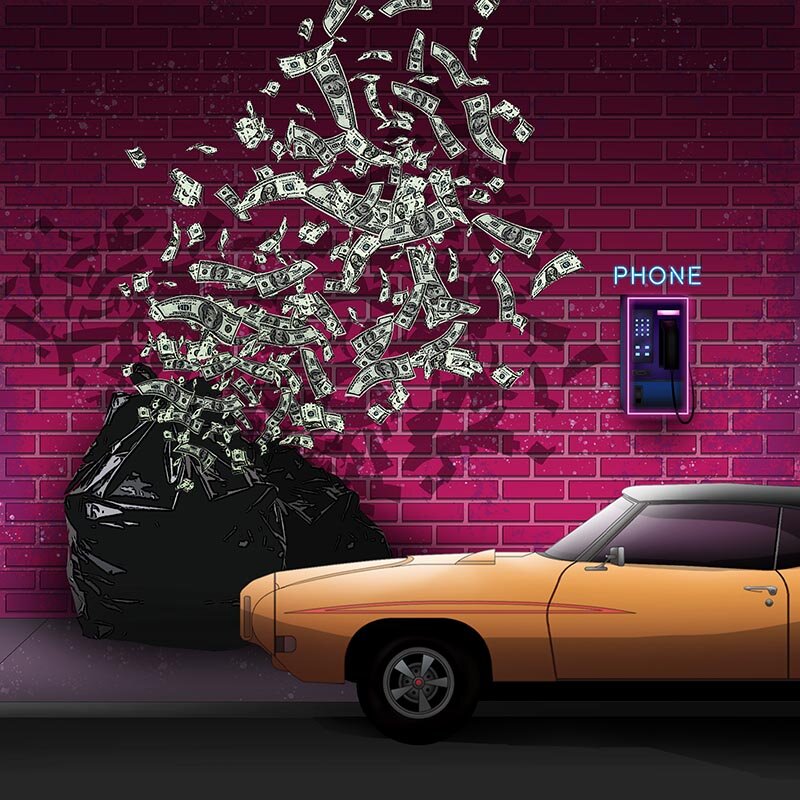Finding Money in Trash
Whether you’re doing it for the planet or with hopes of financial gain, it pays to pick up garbage.
By Jessie Schiewe
Credit: Zita Walker
Each day, Americans produce an average of 5.91 pounds of trash. That’s about as heavy as a teacup chihuahua and almost equal to the weight of a brick. Multiply that for every person in the country and we create about 254 million tons of trash a year.
That’s a lot of discarded stuff, and only about 35% of it is recycled and repurposed into new things. Everything else is just sent to the dump, where it is crushed, buried, and left to slowly decompose.
But not everything that’s thrown away constitutes as trash. Dumpster divers have long known this, targeting the bins behind supermarkets and retail stores for any usable or edible products that may have been chucked. People who scour neighborhoods on trash day or college campuses towards the ends of spring semester know this, too.
From top secret laptops to ancient Mayan artifacts to actual human beings, there’s no telling what you might find in a pile of trash.
It could even be money.
When the Schantz family in Virginia went on a car drive last month, they didn’t expect to come home richer than they’d left. They were simply trying to shake off the cabin fever they’d been experiencing since their state began sheltering-in-place at the end of March.
At some point in their drive, they ran over a bag of trash. They stopped to pick it up, throwing it in the back of their pick-up truck along with another bag that was lying nearby. They kept riding.
It was only when they arrived home and opened the bags that they discovered what was inside of them: nearly $1 million.
Finding money in trash is a long shot, but it’s not particularly uncommon. Even 7-year-olds have found cash in garbage cans. Money has been discovered wedged between the pages of books and stashed in empty shoe boxes. In 2015, a landfill worker discovered clear plastic bags filled with $46,000 in a Georgia city dump.
Even litter on the street can hide treasures. An entire block in Syracuse, New York, was briefly spattered with trash bags one afternoon in March of 2019. Inside were bundles of dollar bills, totaling more than $300,000.
Credit: Flickr/Alan Levine
According to dream interpreters, dreaming about finding money in trash is not a good omen. It can be an indicator of death, misfortune, and bad luck. This rings true, if only for the person who lost the money in the first place. Unsurprisingly, people don’t often throw their cash away intentionally. Although there have been occasions when someone has found the spoils of a bank robbery — the red dye on the dollar bills tend to give it away — most discarded money is an accident.
Relatives cleaning out dead family members’ possessions have unknowingly chucked shoe boxes filled with thousands of dollars. Pillow cases containing $30,000 have been tossed, as have bags containing bank deposits for both mom and pop stores, as well as big retailers, like Macy’s.
“It’s not the first time I’ve heard about someone losing something valuable in the trash or recycling,” an employee at the Recology Humboldt County in Northern California told The Mercury News after a man who threw away a box with $23,000 inside of it contacted them. “It is like trying to find a needle in a haystack.”
Finding money in the trash is different from finding a diamond ring on the beach using a metal detector. There’s no blinking or beeping machine to alert you to the fact that you are in close vicinity to something of value. A wad of bills could be hiding in plain sight, but one has to be willing to get past the rank smells and slimy textures to find it.
A man in Portland, Ore., named Peter who throws away public garbage on a daily basis has been sharing photos of his trash pick-ups to Instagram for the last few years.
“My trash pick-up method is literally picking up whatever is in front of me as I walk from Point A to Point B, meaning I never set out to pick up trash or organize any sort of gathering or goal,” he told OK Whatever. “I only try to demonstrate that any person, anywhere, can help without changing a single thing about their daily routine.”
In fact, in all of his trash pick-ups, Peter has “never found a single dollar” or stumbled across anything worth keeping except an Ikea bag.
“I now keep it in my car for when I drive somewhere and need a trash bag. I also use it on rainy days because wet trash is one-thousand times grosser than dry trash.”
But what if he were to one day find a pile of money in litter? Would he keep it or give it up?
“Good question,” Peter said. “It depends how large. [If it was] single, double, [or] triple digits worth, I would keep. More than that I would report to the police.”
Grappling with what to do with found money is a common conundrum for people who find it in the trash. Those who have kept the spoils for themselves have been known to end up in court and even jail for not fessing up to the find.
Others, wanting to do the right thing, have tried tracking down the original owner of the money. That’s what the Schantz’s did with the nearly $1 million they found. The bundles of bills were labeled “cash vault” leading them to correctly believe that they’d found someone’s lost bank deposit. They contacted the Sheriff's Office and were able to successfully reunite the small fortune with its owner.
When a Brazilian immigrant found a book in a Massachusetts dump stuffed with tens of thousands of dollars, he tried to do the right thing, too, but unfortunately had less clues to go off than the Schantz’s.
“I look if I can see a name in the book, someone put their name in the front page, you know how people write their names in the book?,” he told FOX 8. “My point of view is, I want to see because if someone maybe who separated the money to buy a house, put a down payment for the house. What if that happened to me? If it was me? I’m going to go crazy, alright?”
Unable to find the money’s rightful owner on his own, he decided to wait six months in the hopes that they’d find him and claim the cash.
“I can’t go to sleep without thinking about that now,” he said. “But if nobody claims it, I can say I did my part. Then I can go back to getting sleep every day, no problem.”
Find a chunk of cash and it can be tempting to want to keep it. People who’ve relinquished found fortunes said they’ve had regrets about not smelling the money when it was in their possession or suffered bad dreams tricking them into thinking they’d kept it.
But occasionally there are financial upsides to returning found money. When cash or valuables have been lost from armored trucks en route to the bank, rewards of as much as $10,000 have been given to the people who’ve found and returned the items.
That’s what happened to an antique store owner who returned 14 bags containing a couple hundred thousand dollars that had spilled from a Brink’s truck with a faulty back door.
He fought the urge to pocket the $80,000 he’d picked up and also managed to convince the other people who had found bags of money to surrender their finds, as well. He received a cash reward from the company as a thank you for his honest efforts.
Of course, most trash on the street does not contain money. For most of us, the likelihood of finding a disintegrating Taco Bell bag containing a few thousand dollars is low — but that shouldn’t stop us from picking trash up in the first place. Collecting garbage and putting it in its proper place has the potential to make a difference on an environmental level, even if it’s on a very small scale.
“Tiny little actions make a big difference. It’s just as easy to throw trash on the ground as it is to pick it up off the ground. And think of how big of an impact we could collectively have,” Peter pointed out.
“What if that one piece of trash is the tipping point for a clogged storm drain that affects an ecosystem? Or what if one animal eats that bottle cap and that animal was a mom that had a liter that was essential to the future of the species?”
So the next time you see a piece of trash on the ground, consider picking it up and throwing it away. It might not contain a wad of money that will make you rich, but at least you’ll be helping the planet.












How to profit from childhood memories.